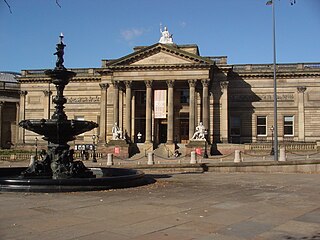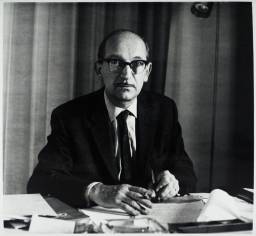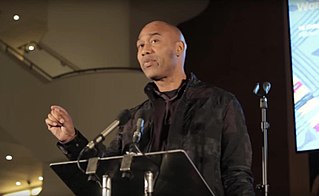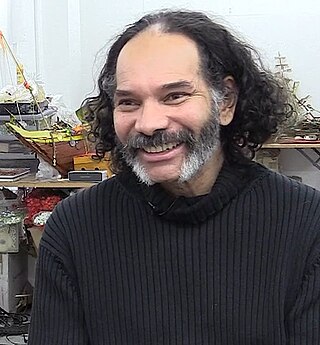
Tate is an institution that houses, in a network of four art galleries, the United Kingdom's national collection of British art, and international modern and contemporary art. It is not a government institution, but its main sponsor is the UK Department for Culture, Media and Sport.

The Scottish Government is the devolved government of Scotland. It was formed in 1999 as the Scottish Executive following the 1997 referendum on Scottish devolution.

The Department for Culture, Media and Sport (DCMS) is a department of His Majesty's Government, with responsibility for culture and sport in England, and some aspects of the media throughout the UK, such as broadcasting.

The Walker Art Gallery is an art gallery in Liverpool, which houses one of the largest art collections in England outside London. It is part of the National Museums Liverpool group.

The Transport Act 1962 is an Act of the Parliament of the United Kingdom. Described as the "most momentous piece of legislation in the field of railway law to have been enacted since the Railway and Canal Traffic Act 1854", it was passed by Harold Macmillan's Conservative government to dissolve the British Transport Commission (BTC), which had been established by Clement Attlee's Labour government in 1947 to oversee railways, canals and road freight transport. The Act established the British Railways Board, which took over the BTC's railway responsibilities from 1 January 1963 until the passing of the Railways Act 1993.

The Public Libraries Act 1850 was an Act of the United Kingdom Parliament which first gave local boroughs the power to establish free public libraries. The Act was the first legislative step in the creation of an enduring national institution that provides universal free access to information and literature, and was indicative of the moral, social and educative concerns of the time. The legacy of the Act can be followed through subsequent legislation that built on and expanded the powers granted in 1850 and the 4,145 public libraries that exist in the United Kingdom in the 21st century can trace their origins back to this Act.
A parish meeting is a meeting all the electors in a civil parish in England are entitled to attend.

The National Gallery and Tate Gallery Act 1954 is an Act of the Parliament of the United Kingdom. The Act came into force in 1955. It created a legal separation between the National Gallery and the Tate Gallery and established the Tate as an independent institution.
An exempt charity is an institution established in England and Wales for charitable purposes which is exempt from registration with, and oversight by, the Charity Commission for England and Wales.

Sir Norman Robert Reid was an arts administrator and painter. He served as the Director of the Tate Gallery from 1964 to 1979.

Augustus Lavinus Casely-Hayford is a British curator, cultural historian, broadcaster and lecturer with ancestral Ghanaian roots in the Casely-Hayford family.

Acceptance in lieu (AiL) is a provision in British tax law under which inheritance tax debts can be written off in exchange for the acquisition of objects of national importance. It was originally established by Chancellor of the Exchequer David Lloyd George as a means for the wealthy to pay the increased estate taxes imposed by his People's Budget of 1909 but had its roots in similar schemes dating to the late 19th century. It has developed from the early years, when it was used mainly as a means for the aristocracy to dispose of country estates to the National Trust, to the modern day, when it is more associated with the transfer of works of art, antiquities and archive material to museums. The scheme is administered by Arts Council England, a non-departmental public body of the Department for Culture, Media and Sport. The scheme has brought many houses, works of art and other collections into publicly accessible institutions when they would otherwise have gone to auction. In April 2013 the Cultural Gifts Scheme was started which allows taxpayers to make a donation of art in return for a credit on income tax, capital gains tax or corporation tax. The Cultural Gifts Scheme is also administered by Arts Council England and is reported jointly with the Acceptance in Lieu scheme.

Hew Donald Joseph Locke is a British sculptor and contemporary visual artist based in Brixton, London. In 2000 he won a Paul Hamlyn Award and the EASTinternational Award. He grew up in Guyana, but lived most of his adult life in London.
National Heritage Act is a stock short title used in Malaysia and the United Kingdom for legislation relating to national heritage.

The Holocaust Act 2009 is an Act of the Parliament of the United Kingdom. Its purpose is to confer, on certain national institutions, a power that was already possessed by other museums to return to their rightful owners cultural objects unlawfully acquired during the Nazi era. It was introduced into Parliament as the Holocaust Restitution Bill. The Bill was amended to give it a different name.
The constitutional provisions in India on the subject of distribution of legislative powers between the Union and the States are defined primarily under its articles 245 and 246. The Seventh Schedule to the Constitution of India specifies the allocation of powers and functions between the Union and the State legislatures. It embodies three lists; namely, the Union List, the State List, and the Concurrent List. The Union list enumerates a total of 97 subjects over which the power of the Union parliament extends. Similarly, the State list enumerates a total of 66 subjects for state legislation. The schedule also spells out a Concurrent list embodying a total of 47 subjects on which both the Union parliament and the state legislatures are empowered to legislate, though this is subject to the other provisions of the constitution that give precedence to the union legislation over that of the states.

The Oil and Gas (Enterprise) Act 1982 is an Act of the Parliament of the United Kingdom which started the process of privatisation of the oil and gas industries in the UK. It empowered the government to float off and sell shares in Britoil the upstream production side of the British National Oil Corporation. It ended the British Gas Corporation’s monopoly on the transportation and supply of gas, opening up the gas market to other gas suppliers. The Act made miscellaneous provisions relating to the oil and gas industries concerning Petroleum Licences and Offshore Installations.

The National Gallery Act 1856 of the United Kingdom Parliament related to the National Gallery and Tate gallery in London, England, with respect to the sale of works of art by the trustees.
The powers of the prime minister of the United Kingdom come from several sources of the UK constitution, including both statute and constitutional convention, but not one single authoritative document. They have been described as "...problematic to outline definitively."










